by Heather Plett | Nov 25, 2015 | Beauty, change, Community, Compassion, connection, Friendship, grace, growth

A few weeks ago, I wrote about the importance of finding your tribe – people who love you just the way you are and who cheer you on as you do courageous things.
Tribe-building is important and valuable, but it only takes you part way down the path to an openhearted life.
This week, I’ve been contemplating what we should do with the people outside of our tribes.
It’s cozy and warm inside a tribe, and the people are supportive and non-threatening, so it’s tempting to simply hide there and close off from the rest of the world. When you’re hurting, that might be the right thing to do for awhile – to protect yourself until you have healed enough to step outside of the circle.
But the problem with staying there too long is that it creates a world of “us and them”. When you stay too close to your own tribe, it becomes easier and easier to justify your own choices and opinions and more and more difficult to understand people who think differently from you. Before long, you’ve become suspicious of everyone outside of your tribe, and when their actions threaten your way of life, you do whatever it takes to protect yourself. Fear breeds in a closed-off life.
Last week, I knew it was time to challenge myself to step outside my tribe. I’d been playing it safe too much lately, so when I saw a Facebook posting for an open house at the local mosque, I decided that was a good place to start. I shared the information with friends, but chose not to bring anyone with me. Bringing friends with me into unfamiliar territory makes me less open to conversations with people who are different from me and I didn’t want that – I wanted to go in with an open, unguarded heart. That’s one of the reasons I’ve learned to love solo traveling – it’s scary at first, but it opens me to a whole world of new opportunities and friendships that don’t happen as naturally when I’m hiding behind the safety of a group.
I have traveled in predominately Muslim parts of the world and have always been warmly received, so I knew that the open house would be a pleasant experience. It turned out to be even more pleasant than I’d expected.
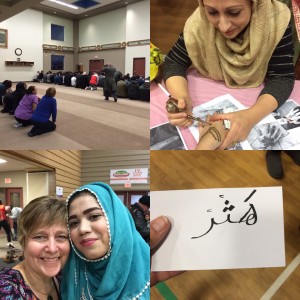 First there was Mariam, a young university student who served as tour guide to me and a small group of strangers. Mariam’s easy smile and warm personality made us all feel instantly comfortable. She lead us through the gym to the prayer room and told us why she’s happy that the women pray in a separate area from the men. “I want to be close to God when I pray, not distracted by who might be looking at me or bumping into me.” Before the tour was over, Mariam hugged me twice and I felt like I’d made a new friend.
First there was Mariam, a young university student who served as tour guide to me and a small group of strangers. Mariam’s easy smile and warm personality made us all feel instantly comfortable. She lead us through the gym to the prayer room and told us why she’s happy that the women pray in a separate area from the men. “I want to be close to God when I pray, not distracted by who might be looking at me or bumping into me.” Before the tour was over, Mariam hugged me twice and I felt like I’d made a new friend.
Then there was the grinning young man at the table by the sign that read “your name in Arabic”. His name now escapes me, but I can tell you he never stopped smiling through our whole conversation and was one of the friendliest young men I’ve met in a long time. He told me, while he wrote my name, that he’d learned some of his Arabic from cartoons. Growing up in Ontario, he’d preferred Arabic cartoons to Barney or Sesame Street.
At the “free henna” table, I met Saadia, who moved here from Pakistan three years ago because she and her husband wanted to give their children a better chance at a good education. Her husband is a doctor who’s still trying to cross all of the hurdles that will allow him to practice in Canada. Before our conversation was over, Saadia had given me her phone number in case I ever want to invite her to my home to give me and my friends hennas.
What struck me, as I left the mosque, was how much grace and courage it takes, when your people have become the object of racism, fear, and oppression, to open your hearts, homes, and gathering places to strangers. Instead of hiding within the safety of their own tribe and justifying their need for protection and safety from others, the local Muslim community threw their doors and hearts open wide and said “let’s be friends. We are not afraid of you – please don’t be afraid of us.”
I experienced the same grace and courage among the Indigenous people of our community last Spring after we were named the “most racist city in Canada”. Instead of retreating into the safety of their tribes, they welcomed many of us into openhearted healing circles. Instead of being angry, they taught us that reconciliation starts with forgiveness and the courage to risk friendships across tribal lines.
I will be forever grateful to Rosanna, who invited me to co-host a series of meaningful conversations with her, to Leonard who handed me a drum and welcomed me to play in honour of Mother Earth’s heartbeat, to Gramma Shingoose who gave me a stone shaped like a heart and shared the story of her healing journey after a childhood in residential school, to Brian who welcomed me into the sweat lodge, and to many others who opened their hearts and reached across the artificial divide between Indigenous and settler.
The more I’ve had the privilege of building friendships with openhearted people whose world looks different from mine, the bigger, more beautiful, and less fearful my life has become.
This week, I’ve read Gloria Steinem’s memoir, My Life on The Road and there is so much in it that resonates with the way I choose to live my life. It’s a beautiful reflection of how her life has been changed by the people she has encountered while on the road. “Taking to the road – by which I mean letting the road take you – changed who I thought I was. The road is messy in the way that real life is messy. It leads us out of denial and into reality, out of theory and into practice, out of caution and into action, out of statistics and into stories – in short, out of our heads and into our hearts. It’s right up there with life-threatening emergencies and truly mutual sex as a way of being fully alive in the present.”
Another quote speaks to how much broader her thinking has become because of her encounters on the road. “What we’ve been told about this country is way too limited by generalities, sound bites, and even the supposedly enlightened idea that there are two sides to every question. In fact, many questions have three or seven or a dozen sides. Sometimes I think the only real division into two is between people who divide everything into two and those who don’t.”
We don’t have to spend as much time traveling as Gloria Steinem does in order to live this way – we simply have to open our hearts to the people and experiences in our own communities that have the potential to stretch and change us and lead us past a life with only two sides. Sometimes a conversation with the next door neighbour is enough to help us see the world through more open eyes.
* * * * *
p.s. Would you consider supporting our fundraiser to sponsor a Syrian refugee family?
Interested in more articles like this? Add your name to my email list and you’ll receive a free ebook, A Path to Connection. I send out weekly newsletters and updates on my work.
by Heather Plett | Oct 3, 2014 | Beauty, growth, journey, Spirituality, Uncategorized, Wisdom
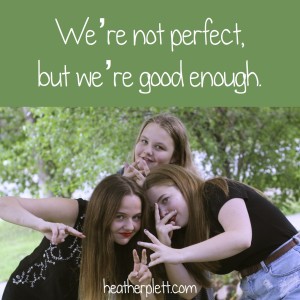 I was raised on a healthy dose of “only a sinner, saved by grace”. Again and again the Sunday School songs reminded me to carry the shame of the sin that had separated me from God. I was nothing without salvation – a wretch, a lost soul, a disgrace.
I was raised on a healthy dose of “only a sinner, saved by grace”. Again and again the Sunday School songs reminded me to carry the shame of the sin that had separated me from God. I was nothing without salvation – a wretch, a lost soul, a disgrace.
On top of that, I was a woman – reduced to second class in the eyes of a male (understanding of) God. Not good enough to have my own voice. Not strong enough to lead without a man as the head.
And then, to add to those stories of unworthiness and submissiveness, I was a Mennonite, taught to be a pacifist, discouraged from standing up for myself. Turn the other cheek and don’t rock the boat.
Let’s not forget that I’m also a Canadian, and people in my country place politeness high in our values.
That’s a lot of old stories that contribute to my “I am worthless” back story.
Now…I’m not going to argue the theology or “rightness” of any of those belief systems – I’m just speaking from my own experience here. I’m just saying that it’s hard to emerge from a history like that with a healthy self-confidence and a belief in one’s worthiness.
It took a lot of personal work to start telling myself other stories. It took a lot to begin to believe that I was worthy of love, that I was equal to men, that I could believe in a God that was both masculine AND feminine, and that I was “fearfully and wonderfully made”.
For awhile the pendulum swung in the other direction. I started to embrace those self-help books that told me that I am awesome, I am powerful, and I can do anything I set my mind to. I started to believe that I was a self-made woman and that I didn’t need faith in a God who made me feel worthless.
But the other end of the pendulum wasn’t comfortable for long either. If I am awesome, than I don’t need other people. If I am perfect the way I am than I can get away with treating people poorly and not cleaning up after myself. If I can do anything I set my mind to, then I don’t need grace and I don’t need God and I certainly don’t need to pay attention to the wounds all of us AWESOME people are inflicting on the world.
And what if I don’t FEEL awesome all of the time? Then do I send myself back to the “unworthy” end of the pendulum because other people have figured out this self-help stuff better than I have? And what about when I do something that is really selfish – do I simply excuse myself with an “I am worth it” mantra? Do I never hold myself accountable for my screw-ups or unkind acts? And if there’s no need for grace, then how do I pick myself up after a particularly horrible failure?
Gradually the pendulum swung back, but this time it landed somewhere in the middle. This time it stopped in the grey area – the paradox.
- I am beautiful AND I have a lot of flaws.
- I am smart and capable and have a lot of gifts AND I need to be forgiven when I make mistakes.
- I am loving and kind AND sometimes I do things that are downright mean and hurtful.
- I have been fearfully and wonderfully made AND I need a lot of grace for those times when I don’t act or feel like it.
- I am full of wisdom AND I rely on God/dess to help me use that wisdom with discernment.
- I am a sinner AND I am a saint.
- I am good enough as I am AND I need to keep working to improve myself.
- I am as worthy as any man on earth AND I want to keep living on a planet where both genders are needed.
The grey area is a good place to live. It feels comfortable, because I don’t need to be perfect, but I also don’t need to believe that I am worthless. It’s the field that Rumi talks about – I want to lie down in that grass with you.
“Beyond our ideas of right-doing and wrong-doing,
there is a field. I’ll meet you there.
When the soul lies down in that grass,
the world is too full to talk about.
Ideas, language, even the phrase ‘each other’
doesn’t make sense any more.”
Rumi
p.s. There is still space in tomorrow’s Openhearted Writing Circle, if you want to explore how your own writing can help you get to an “I am enough” place.
by Heather Plett | Feb 6, 2014 | Beauty, circle, Creativity, Uncategorized
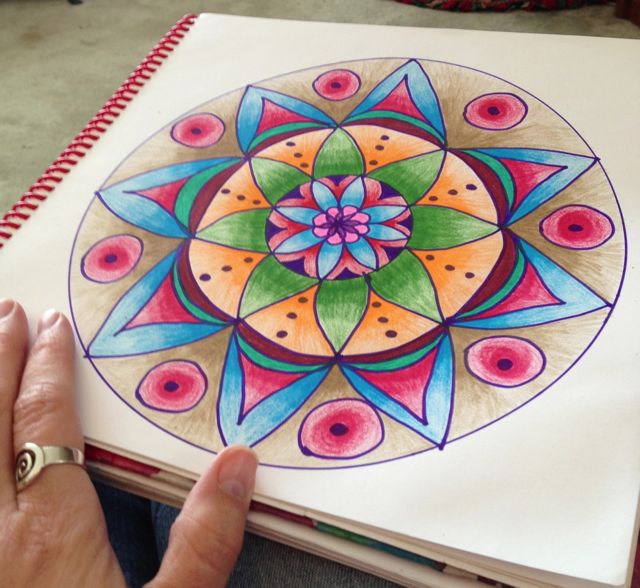 I see more and more women (and some men) who are finding their way back to the things they love to do – painting, dancing, writing, hosting, horseback riding, hiking, taking pictures, acting, etc.
I see more and more women (and some men) who are finding their way back to the things they love to do – painting, dancing, writing, hosting, horseback riding, hiking, taking pictures, acting, etc.
I work with a lot of these people, in my coaching and workshop facilitation, and I love to see the delight in their eyes when they talk about what they truly love to do. Some, for example, sit in my Creative Writing for Self-discovery circle and talk about how writing poetry feels like a homecoming – like something they’ve been longing for but didn’t know they were missing. Others start playing with mandalas and can’t believe how much joy it brings them to hold pencil crayons in their hands again.
Almost always, though, I see that delight in their eyes fade when I ask them “why don’t you do more of it?” They stammer a reply that sounds remarkably similar to all of the other excuses I’ve heard (I’m too busy, it makes me feel guilty, my partner makes fun of me, I can’t take the time away from my kids, etc.). And when they come back a week later, they sheepishly say “I wanted to do the homework, but couldn’t find the time.”
The bottom line is that they have been fed a lie that what they love to do is trivial. It’s the thing you do only if you have time after all of the important things are done. It’s just a hobby, so shouldn’t be taken as seriously as washing the dishes or crunching numbers at the accounting office you work at.
I have struggled with this lie in my own work too. Sure I teach transformational workshops online and off, but it’s not really that important, is it? It’s just stuff people do on the fringes of their lives – it doesn’t fit in the “mainstream” where people are doing real work. Even though I believe in it deeply and know it can transform people and communities, I have trouble marketing my work in the corporate world, because… well… won’t people make fun of me for trying to sell something so trivial in a serious environment?
Mandala journaling? That’s fine for people with time on their hands, but don’t try to get a serious corporate executive to colour in a circle. It’s far too trivial for someone with an important job title. Gathering in circle? Oh that’s just for women who aren’t doing the big, important work in the world. It’s not going to fly in places where people are having tough conversations and changing the world.
But it’s all a lie, and I know that. It’s the lie the patriarchy has been telling us for hundreds of years to keep us silent and to keep us from changing the accepted structures and heirarchy. It’s a lie we’ve been fed again and again, since childhood, and we don’t know how to change it because we’ve received so many wounds over it, we’ve learned to hide our hearts and keep our deepest loves secret.
Imagine if we could rise out of the shame and the fear and truly believe in what we love to do.
Imagine if we could convince governments to move their chairs into circles and have real conversations instead of the polarizing shouting they do at each other from across the room. Imagine if business meetings started with some quiet journaling or mandala-making. Imagine if there was daily dancing in the corporate offices downtown. Imagine if the heads of corporations and governments had to go on vision quests or self-discovery retreats before they could be trusted to lead.
It’s hard to imagine, isn’t it? Your first thought, like mine, was probably “oh, it would never work”. But what if every time we heard that voice of resistance in ourselves, we recognized it as the voice of the patriarchy trying to silence us, and we challenged it instead of accepting it?
A few weeks ago, I co-facilitated a weekend stakeholder consultation for a national association of city planners. Because we knew it would be a difficult conversation, we encouraged them to use circle to ensure that everyone was heard. There was some reluctance to our recommendation, but fortunately we had an ally on the planning committee, and so we went ahead with it. The circle transformed the way they gathered. People made positive contributions throughout the weekend because they felt heard. Important decisions were made AND people felt valued and hopeful.
The circle is NOT too trivial for people who are making important business decisions. In fact, I think it’s imperative.
A few years ago, I was facilitating a team planning retreat for a non-profit, and I invited everyone to start with some simple yoga poses, and then we played with modeling clay and tried to envision our future through clay. Halfway through, one of the people in the room said, “but when are we going to do the real work?” He was anxious to get to the strategic planning we needed to do. I didn’t say much, but when we were finished, we looked at each other’s clay creations and saw a great deal of vision for where the team needed to move. “Oh, I get it,” said the person who had resisted. “This IS the real work.” Yes, it is. We saw more vision emerge from the pieces of clay than we would have in a traditional brainstorming session.
Art-making and yoga are NOT too trivial for people doing world-changing work. In fact, I think it’s imperative.
It’s taken me years to stop believing the lie (and it still creeps in now and then), but I believe that the world is crying out for us to do this work. It’s transformational for EVERYONE, not just the people with time on their hands after the real work is done.
It starts by changing us individually, and with that as a base, it can change governments, change international relationships, change the way we treat our earth, and change our communities.
I believe it’s imperative. The world needs this kind of change. And it will have to start with a healing of our collective wound and a new belief that this is worthy work we are doing.
If you are on the path to the work you love, or you want to step onto that path, consider a journey through Pathfinder.
If you want to practice openhearted writing, consider joining a small, intimate virtual circle on Friday, February 14th.
by Heather Plett | Nov 12, 2013 | Beauty
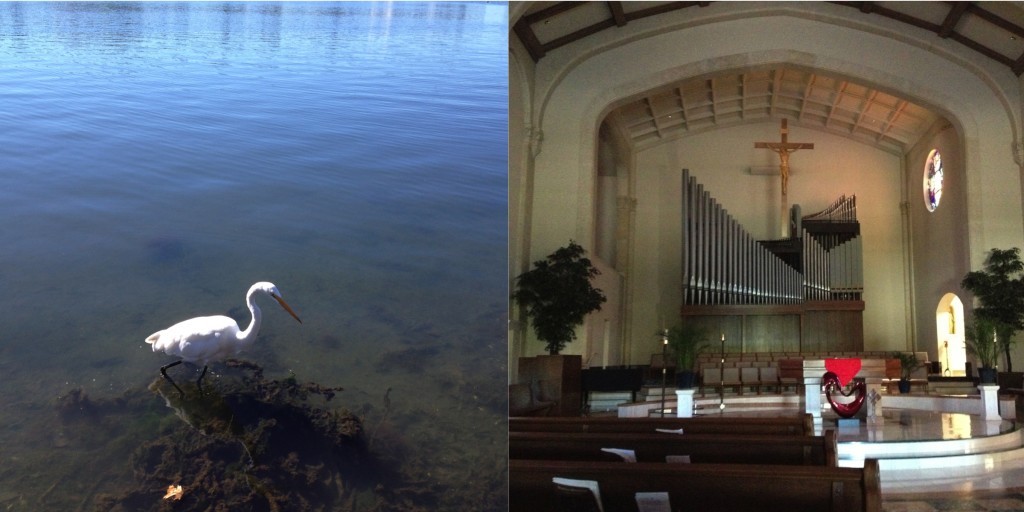
I sat on the shores of the lake, watching the birds float and fly past. A cormorant stood on a post, its wings spread wide to the sunshine. The lake is a wildlife sanctuary. In that space, the birds are safe to do what is truest to their natures. No predators can harm them there.
Sanctuary. A place to be safe.
Wildlife sanctuary. A place to be safe in your wildness.
Near the lake was a church. I wandered inside. It was beautiful, polished, and serene. A sanctuary.
And yet… it wasn’t a wildlife sanctuary. My wildness did not feel safe in that place. I wanted it to – longed for a real sanctuary where my wildness was honoured – but I didn’t trust the immaculateness. I couldn’t feel safe revealing all of myself in that space. Too much of me had been judged in spaces like that in the past.
“What if I DID feel safe in this space?” I thought. “How would church be different if it were more like a wildlife sanctuary? If it were the kind of place where we could be totally free to be our wild selves without feeling the pressure to conform? Without having to protect ourselves from predators? What if it truly represented the wild way that God loves?”
As though to test my question, I took off my shoes and stepped into the baptismal font. The water was cool and sweet against my skin. It felt good – a baptism of my wildness. But it didn’t feel safe. I kept an eye on the door, expecting a stern priest to walk in and send me away for defiling the church. All I dared to reveal was my feet. I stepped out quickly and tried not to leave footprints.
I went back outside to the lake. There I felt safe. With the birds and the trees. I took of my shoes again and didn’t worry about footprints.
A week later, at another lake, giggling in the dark with a small tribe of friends, I tripped through the woods and stepped into the lake. Tentatively, we inched our way into the dark water. It held us and invited us further in. We gave ourselves to it. Bathing suits came off and we let ourselves be baptized in our wildness. For long lazy moments, we floated – just a little bit fearful and yet fully wild and fully alive.
This was our wildlife sanctuary. Here we were safe to reveal all that we were. Here we were wholly loved – by the water, by each other, by the gods of our understanding.
From the moment we step away from the safety of our parents’ arms, we are each on a lifelong quest for that place of sanctuary – that place were we can dare to let ourselves be fully wild, fully naked, and fully baptized. Sometimes (far too rarely) we find it in a church, sometimes we find it in the woods with a circle of friends. Sometimes we only find tiny whispers of it that make us long for more.
Once we find it, we know that we need more of it and we know that we need to commit our lives to co-creating it for others. Because there is nothing quite like the feeling of knowing that we are fully loved and accepted in our nakedness. There is nothing that makes us feel more alive and beautiful.
Together, those of us who have learned to reveal our wounds and our nakedness to each other, become co-creators of circles of grace. We are wildlife sanctuary keepers. We are witnesses of the kind of God/dess who longs to help us create REAL sanctuaries, not artificial polished spaces where only those who have washed first can step into the baptismal font.
Because living truthfully in our wildness is the only way to fully be alive.
If you are longing for more of your wildness to be revealed, step into the sanctuary of Lead with Your Wild Heart. You are safe here.
by Heather Plett | Oct 9, 2013 | Beauty, circle, Compassion, Uncategorized
I am carrying a huge basket of stories that I gathered on my trip. Each day I added new stories emerging from the deep conversations I had with people in my travels through Reno, Lake Tahoe, Oakland, San Francisco, Atlanta, Asheville, and finally Lake Lanier. I want to share all of those stories with you, but some of them need to ripen in the basket a little longer before they’ll be ready to be harvested.
First of all, let me tell you that this trip was all about love. Here’s what I posted on Facebook when I first got home…
After all of my travels in five states, after all of the deep and soulful conversations, after the early morning sunrises over the lake, after the sharing circles, after the ziplining, after the skinny-dipping, after the wandering in the woods, after the cracking open of many hearts, after my talk about the courage to lead differently, after bountiful feasts from the hands of many farmers, after the laughter, after the tears, after the deep body hugs and the tenderhearted kisses… after it all fades into memory, my learning can be boiled down to the words on the mug I brought home… Love more. Love fiercely and deeply. Love courageously. Love ridiculously. Love the sky and the earth and the dogs and the caterpillars. Love the wine and the music. Love the brave hearts and the fearful hearts. Love the ones that are easy to love and those who are more difficult. Love with wild abandon. Love until your heart cracks wide open and we all see the fleshy softness inside. Love more and let yourself be loved. Don’t be afraid of love.
It might sound rather pie-in-the-sky, but it’s the ground on which I stand. Love is what let me go on this journey when so many of you supported this dream. Love is what let me connect with beautiful people all along the way. Love is what inspired me to share from my heart on stage. Love is what gave me the courage to believe I had something to share. It’s all about love.
Almost as soon as I got home from my journey, reality smacked me across the face. There’s a huge crack in our basement wall that will probably cost us thousands to fix, my aunt died of brain cancer while I was away and her funeral was yesterday, I’m dealing with a nasty bug bite that I got in Atlanta that seems to be infected and I spent yesterday evening in urgent care, and there’s a little heartbreak in my relationship with one of my daughters. Any of those things individually could have sent me into a tailspin of despair, but they didn’t. I’m okay. I’m more than okay. I am feeling strong and courageous, and – more than anything – loved.
LOVE has made me resilient. LOVE has given me courage. LOVE has given me hope.
At Patti Digh’s Design Your Life Camp at Lake Lanier last week, Maya Stein and Amy Tingle did something so breathtakingly beautiful and full of love, I found my heart breaking wide open. First of all, they’d brought their vintage trailer MAUDE (Mobile Art Unit Designed for Everyone) along to camp and they were inviting everyone to visit to make art tags to hang in a tree. Secondly, they each had vintage typewriters, and if you offered them a single word, they would each write a spontaneous poem on an index card made especially for you. They did both of these things with beauty, grace and generosity, not asking to be paid or flaunting their brand in anyone’s face – simply offering this gift to anyone who would receive it.
The first time I saw them with their typewriters, I felt a little overwhelmed – not sure I could step forward and feel worthy enough of the gift. I was intrigued, but it felt somehow vulnerable and tender to give them a word and then simply receive. I had already received so much on this journey (and even before the journey in order to make it possible) that the gremlins were saying “You’ve received enough. You had the AUDACITY to ask people to help pay for this trip. How DARE you think that you are worthy of another gift?”
When I came out of the session the next evening, though, and saw them with their typewriters again, I knew I just had to do it. I knew I was worthy. I knew, deep down in my bones, that I wanted this gift and was ready to receive it.
I stood in line and waited… and agonized over what word was the right one. I wrote one word down, but then it didn’t feel right, so I scratched it out. Just before I got to the front of the line, I knew what my word was. Resilient.
Resilient is how I feel these past couple of months as I emerge into my work in a bigger way after the hard, hard year of losing Mom, watching my husband have a heart attack, breaking my foot, and then finding out my brother has stage 4 cancer. Resilient is what I’ve been in the past, after losing dad very suddenly, having a stillborn son, and watching the man I love wrestle with depression so powerful he attempted suicide twice. Resilience is one of my strengths and it’s one of the gifts I give to my clients in this work of being real and courageous and hopeful in this broken world.
And so I stood there, tenderly and anxiously, waiting to see what they’d do with the word resilient.
What emerged floored me and broke me open.
Here’s what Amy wrote:
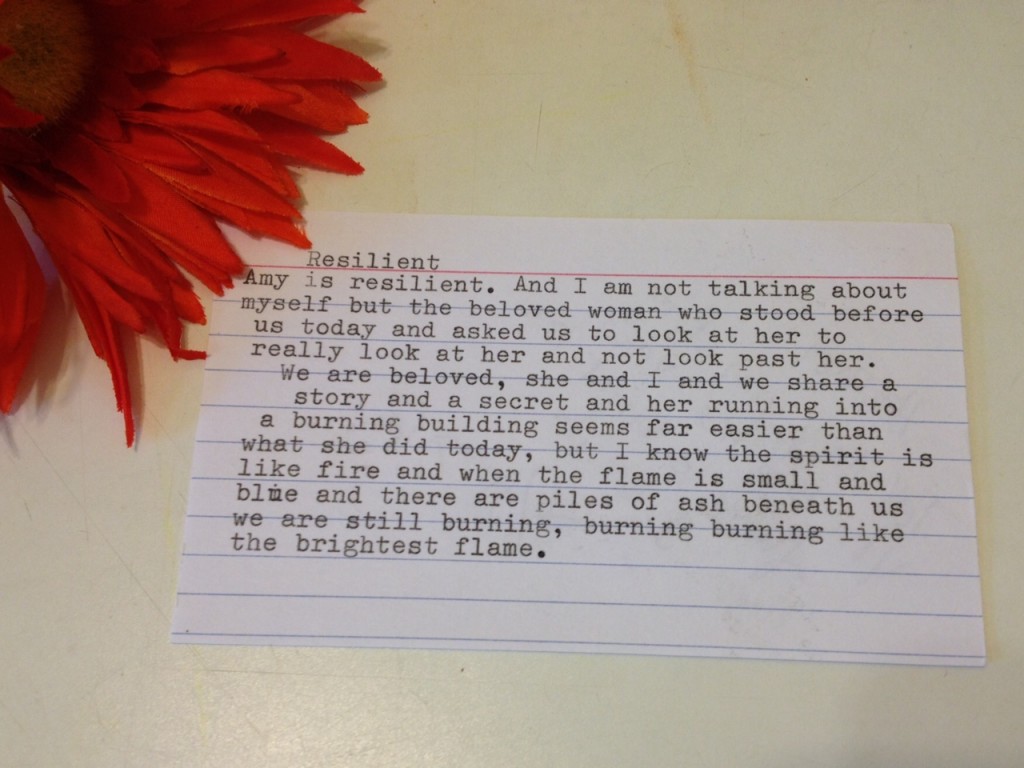 The Amy she mentioned is Amy Dier, who had just shared a very personal story from the stage about learning to love and trust herself and allow herself to be seen. She was a former police officer who’d gone into law enforcement partly because she’d been raped when she was a teenager. She said she’d only shared the story of her rape with 8 people before saying it aloud in this room full of 150 people. After sharing the story, she invited us all to stand in a circle and she walked around the circle, looking into our eyes, and saying to each of us one at a time “I see you.”
The Amy she mentioned is Amy Dier, who had just shared a very personal story from the stage about learning to love and trust herself and allow herself to be seen. She was a former police officer who’d gone into law enforcement partly because she’d been raped when she was a teenager. She said she’d only shared the story of her rape with 8 people before saying it aloud in this room full of 150 people. After sharing the story, she invited us all to stand in a circle and she walked around the circle, looking into our eyes, and saying to each of us one at a time “I see you.”
What Amy the poet had no way of knowing was that Amy Dier and I do indeed share a story or two – the story of surviving rape, as well as the story of learning to believe we are worthy of being seen.
The second poem, from Maya, was the perfect addition, in a way that neither poet could possibly have known.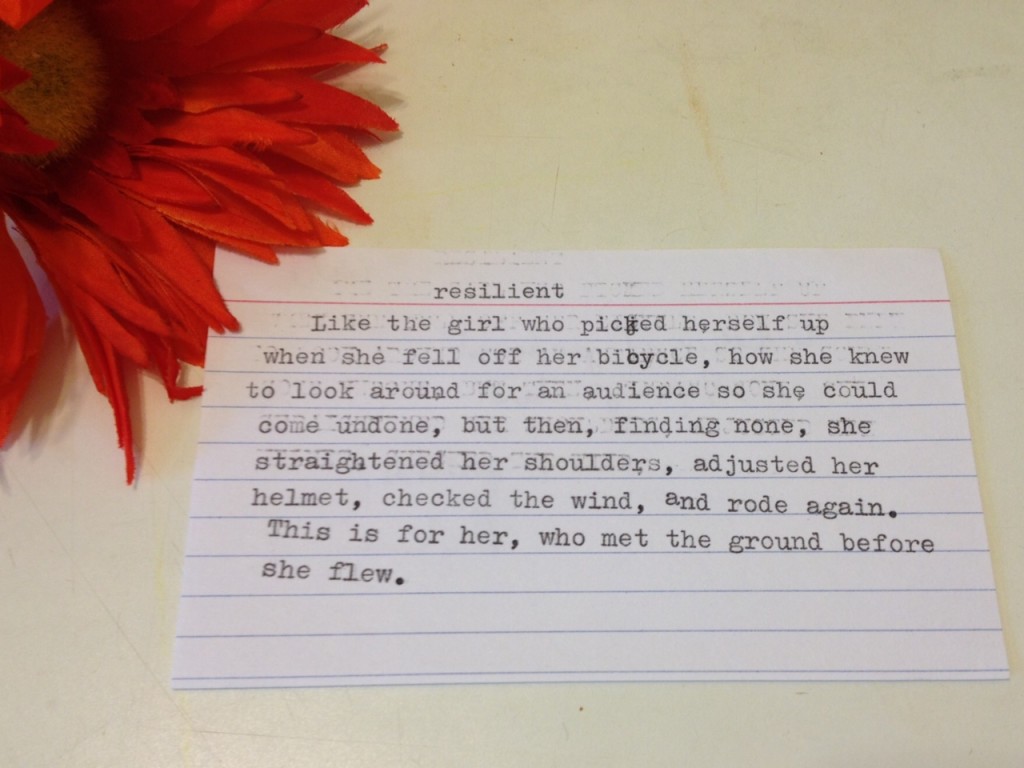 The day after I was raped by a man who climbed through my bedroom window, I was supposed to take part in a triathlon relay race. I was going to ride 40 kilometres on my bicycle, while others did the running and swimming legs. This felt like a courageous and fierce act for me at the time, given the fact that I’d never believed I was athletic enough to be in any competition of that sort.
The day after I was raped by a man who climbed through my bedroom window, I was supposed to take part in a triathlon relay race. I was going to ride 40 kilometres on my bicycle, while others did the running and swimming legs. This felt like a courageous and fierce act for me at the time, given the fact that I’d never believed I was athletic enough to be in any competition of that sort.
I never completed that bicycle ride. My body was too sore after the abuse it took at the hands of the rapist. Plus I felt a strong urge to drive home to the farm to be with my Mom and Dad.
But that doesn’t mean I didn’t get back on the bicycle, again and again and again. My whole life has been an act of getting back on that bicycle, each time I fall down. Through all of the deaths, disappointment, and tragedy in my life, I keep getting back on my bicycle – both literally and figuratively. (Ironically, I was actually on my way into the garage to go for a bike ride with my daughter when I broke my foot in Spring. Another metaphor, perhaps?)
And that brings me back to love. I get back on my bicycle because of love. I stay in a marriage that has been challenging because of love. I keep showing up for funerals because of love. I drive across the country to be with my brother after cancer surgery because of love. I sit beside my mother and watch her die because of love. I show up for my teenagers even when they’re snarly because of love. I travel across the country and sit in circle with myriads of beautiful people because of love. I coach my clients and host retreats because of love.
I do what I do because I have been given a lot of love and because I have a lot of love to give.
I pour love into everything I do. And love is what sustains me and gives me courage for this work. Because love is worth it. Love has made me who I am, and that is a beautiful thing.
The next time you need courage or resilience, remember that it starts with love. Give love and receive it and you will be able to get back on that bicycle, no matter how many times you fall.
Go ahead, love more.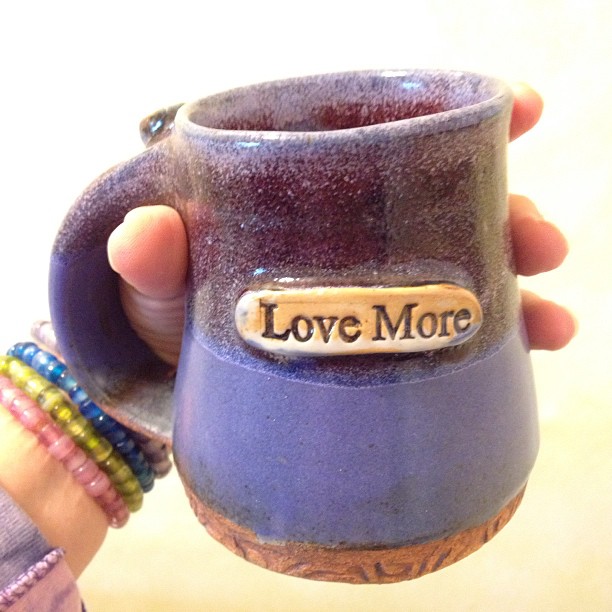
by Heather Plett | Aug 26, 2013 | Beauty, calling, Intuition, journey, Labyrinth
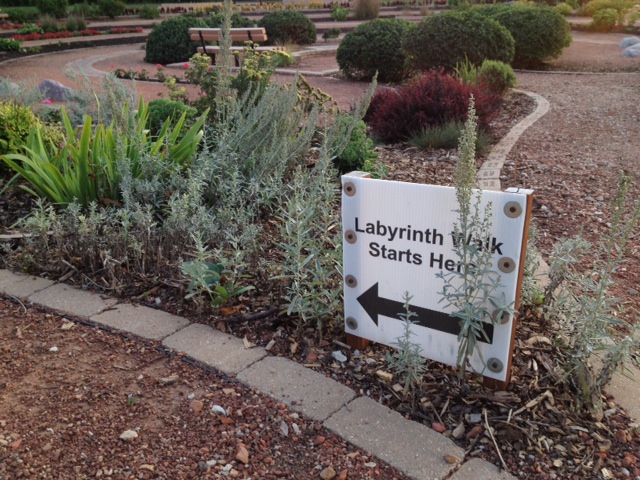 When you stand at the very centre of the Carol Shield’s labyrinth, as I did yesterday evening, and speak out to the edges, you will hear your own voice echoed ever so slightly back to you. You have to listen very carefully to hear it and you have to be standing in exactly the right spot or the echo evades you.
When you stand at the very centre of the Carol Shield’s labyrinth, as I did yesterday evening, and speak out to the edges, you will hear your own voice echoed ever so slightly back to you. You have to listen very carefully to hear it and you have to be standing in exactly the right spot or the echo evades you.
In labyrinthian journeys, the centre is known as the place where you open yourself to receiving from Spirit, after walking in and releasing what was previously getting in the way.
Which begs the question… what am I meant to receive from the echo of my own voice? What wisdom is already hidden in me that I might not yet be aware of?
Yesterday in church the pastor spoke about giftedness – how we need only be faithful with our gifts in order for them to multiply. At the centre of the labyrinth, I thought about that in relation to my voice. It’s a gift that already exists, coming out of a wisdom that God has already planted within me, and I don’t need to keep looking elsewhere for my source of inspiration.
Faithfulness to our gifts means that we must exercise them, train them, and grow them. Practice and study are both very important, but what’s also important is a deep level of trust in the gift itself.
In our eagerness to perfect the gift, and our insecurity about using it before it is sufficiently polished, we forget about the ancient wisdom already there. We forget that the unpolished gift already has beauty.
When I was a child, I had a growing realization that I had a unique ability to see things – to really see them in a deeper way than most people did. When I would try to explain things that I’d seen to other people, I knew by their lack of understanding that they’d never witnessed them in the same way that I did.
These were fairly ordinary things, but for me they had an aura of magic. For example, I was always captivated by the image of deer leaping over fences. That sight would freeze me in my tracks and I was stand in awe at the magic I had just witnessed. When I would try to explain how that sight impacted me, people would usually look at me with a puzzled look and I knew that they’d only ever seen deer leaping over fences as ordinary and not transcendent.
I stopped talking about things that seemed mystical to me. It made me feel too much like an oddball. Now, years later, I recognize that ability to see things as a part of the ancient wisdom buried in me. I am a meaning-maker, a storycatcher, a seer… perhaps even a mystic. I see metaphor and meaning in things that pass many people by. I receive messages from deer or trees or sunsets and I walk away changed. It’s still not always easy to talk about (as I mentioned in my last post), but I am growing in my ability to trust it.
In The Naked Now: Learning to See as the Mystics See, Richard Rohr talks about the three ways to see a sunset…
One man saw the immense physical beauty and enjoyed the event in itself. This man was the “sensate” type who, like 80 percent of the world, deals with what he can see, feel, touch, move, and fix. This was enough reality for him, for he had little interest in larger ideas, intuitions, or the grand scheme of things. He saw with his first eye, which was good.
A second man saw the sunset. He enjoyed all the beauty that the first man did. Like all lovers of coherent thought, technology, and science, he also enjoyed his power to make sense of the universe and explain what he discovered. He thought about the cyclical rotations of planets and stars. Through imagination, intuition, and reason, he saw with his second eye, which was even better.
The third man saw the sunset, knowing and enjoying all that the first and the second men did. But in his ability to progress from seeing to explaining to “tasting,” he also remained in awe before an underlying mystery, coherence, and spaciousness that connected him with everything else. He used his third eye, which is the full goal of all seeing and all knowing. This was the best.
The third man, who sees with his third eye, is a mystic. As soon as I read Rohr’s description of what it means to be a mystic, I knew that this had something to do with the way that I’d always seen the world. The seeds of mysticism were already there when I stood in awe of deer leaping over fences.
I have read a thousand books, taken a thousand classes, and yet none of them can teach me to access the ancient wisdom – the wisdom of the seer – that is already within me. None of them can point to the gift that is meant for me to share. For that I must quiet all of the external voices, remove myself from the noise of my life and walk a labyrinth or wander the woods. That is when my own voice is echoed back at me and I know that I already have what I need.
What is the ancient wisdom buried in you? It may be body wisdom, heart wisdom, or head wisdom. It may be the ability to see justice, create order, experience beauty, shape stories, make people laugh, or offer compassion. What did you already know as a child, but might have been afraid to speak of or do or be because it made you seem like an oddball? What do you now need to do to create space for that wisdom to emerge?
To start with, find a quiet place where your wisdom can echo back to you through the silence. Walk away from the noise of other people’s voices and expectations and stand in silence with your God. In that quiet place, let your gift emerge from its hiding place, let it fill your heart with knowing, and give yourself permission to trust it. Then, by all means, practice, train, and polish it, but don’t forget to use it in the meantime. It already has value.
The gift is yours – be faithful in using it and it will multiply.
 First there was Mariam, a young university student who served as tour guide to me and a small group of strangers. Mariam’s easy smile and warm personality made us all feel instantly comfortable. She lead us through the gym to the prayer room and told us why she’s happy that the women pray in a separate area from the men. “I want to be close to God when I pray, not distracted by who might be looking at me or bumping into me.” Before the tour was over, Mariam hugged me twice and I felt like I’d made a new friend.
First there was Mariam, a young university student who served as tour guide to me and a small group of strangers. Mariam’s easy smile and warm personality made us all feel instantly comfortable. She lead us through the gym to the prayer room and told us why she’s happy that the women pray in a separate area from the men. “I want to be close to God when I pray, not distracted by who might be looking at me or bumping into me.” Before the tour was over, Mariam hugged me twice and I felt like I’d made a new friend.








